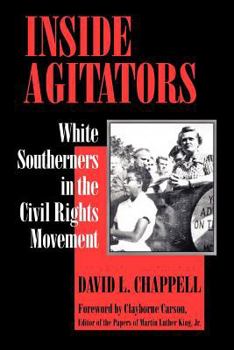Inside Agitators: White Southerners in the Civil Rights Movement
Select Format
Select Condition 
Book Overview
Winner of the Outstanding Book on the Subject of Human Rights in North America Award from the Gustavus Myers Center In the movement, we always said that, like in a washing machine, it was the agitator that got the dirt out. David Chappell's book shows how the inside agitators helped cleanse the society of an extreme injustice. It is an enlightening and important look at a less publicized part of this history. -Andrew Young A superb...
Format:Paperback
Language:English
ISBN:080185234X
ISBN13:9780801852343
Release Date:April 1996
Publisher:Johns Hopkins University Press
Length:336 Pages
Weight:1.15 lbs.
Dimensions:0.9" x 6.1" x 8.8"
Customer Reviews
3 ratings
All students of Civil Rights should read this book
Published by Thriftbooks.com User , 24 years ago
Chappell sets out to dispel the myth that all white southerners were raging segregationists. In fact, during the Post-Reconstruction period, Chappell argues, there were whites that believed the southern system was racial unjust and they sought to alleviate these unfair conditions for blacks. Chappell, however, clearly points out these early white dissenters, like Washington Cable and Justice Harlan, did not foster notions of racial equality because they were still indoctrinated in the "scientific" argument that declared blacks racially inferior. Although these early white dissenters (pre-1950's) did not alter the southern way of life, Chappell contends that they influenced the consciousness of white moderates in the 1950's. Blacks and whites did not live in segregated worlds, according to Chappell, thus blacks understood their white neighbors and could pinpoint their weaknesses, which aided in the movement. White moderates became central figures in the movement, not always because they saw the immorality of the segregated system but rather they sought to re-establish peace and social stability. Thus Chappell maintains that morality and politics cannot be separated when discussing the civil rights movement. White liberals, according to Chappell, grew tired of the violence (lynching often produced outspoken disgust among southern white moderates) and national media attention; therefore, the middle of the way whites felt that the segregated system was not worth defending. White moderates became intermediaries between southern racist demagogues and protestors. These whites would later compete for leadership against these `die-hard segregationists' due to their incompetence in maintaining the peace. Montgomery, Little Rock, and Tallahassee all illustrate Chappell's argument that it was the white moderates who brought about compromises with the protestors. Albany, however, was the only movement that did not follow along the previous models which was due to Chief Laurie Pritchett's incorporation of the nonviolent techniques that the protestors utilized. Finally, Chappell discussed the political reaction to the movement. The Democratic Party was becoming irreparably divided over the segregation issue. Lyndon Johnson sought to save the Democratic Party by neutralizing the race issue in Congress, thus leaving the matter in the hands of local business leaders and corporations. This is an excellent, well written book that is easy to read. The third part of the book seems to divert from the original focus of the book, but Chappell still captivates the reader.
GREAT BOOK.
Published by Thriftbooks.com User , 24 years ago
Chappell gives four fascinating case studies on how white Southerners--and not just the few white liberals--made an important contribution to the movement. I was there, and I know they did. No other book out there pays this kind of attention to them.
A Must Read For Anyone Who Wants To Understand Civil Rights
Published by Thriftbooks.com User , 24 years ago
David Chappell's study of the role of white Southerners in the Civil Rights movement is fascinating. While not denying that black activists were the real movers and shakers, Chappell shows that we can't understand why the movement succeeded without understanding the role of white Southerners. He quotes Andrew Young, King's right hand man, as saying that without the white Southerners who helped out the movement, the movement would have failed. Chappell shows that the movement succeeded in places where white Southerners, wittingly and unwittingly, cooperated with the civil rights activists, and failed in places like Albany, Georgia, where they did not. But the best part is that Chappell is such a great writer! If you want to know something about the Civil Rights movement, read this book.






